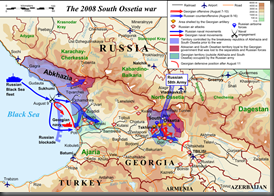
"Urbi et Orbi" significa "a cidade e o mundo" em latim. Para nós, é um espaço privilegiado para a discussão das questões internacionais, em suas múltiplas e inesperadas dimensões. Aqui você terá análises de vários temas, divulgação de eventos e periódicos em RI e comentários sobre a profissão de analista internacional. Criado por e para estudantes de RI, este blog também está aberto a contribuições de especialistas de outras áreas e leigos que se interessem pelos estudos internacionais.
segunda-feira, 30 de agosto de 2010
Analysis: The August war, two years later

Urbi et Orbi: Posts in English

domingo, 8 de agosto de 2010
Análise: A Guerra de Agosto dois anos depois
 O dia de hoje (08 de agosto) marca os dois anos do início do conflito que envolveu a Geórgia e Rússia. Enquanto as atenções do mundo estavam direcionadas para os Jogos Olímpicos de Pequim, os dois vizinhos do Cáucaso recorriam à força para resolver a controvérsia concernente ao status das regiões da Ossétia do Sul e da Abcásia. À época, uma poderosa guerra de informação empreendida pelos dois lados impediu uma avaliação sobre quem seria o “agressor” e a “vítima”. Baixada a poeira da guerra, uma comissão independente, chefiada pela diplomata suíça Heidi Tagliavini, elaborou um detalhado relatório buscando recuperar os dados referentes ao conflito. A conclusão do Relatório Tagliavini atribuiu aos dois lados a “culpa” pela guerra: à Geórgia, por ter iniciado os ataques às forças separatistas e às tropas de paz russas na Ossétia do Sul; e à Rússia, por ter provocado os georgianos e por ter respondido desproporcionalmente às investidas de Tbilisi.
O dia de hoje (08 de agosto) marca os dois anos do início do conflito que envolveu a Geórgia e Rússia. Enquanto as atenções do mundo estavam direcionadas para os Jogos Olímpicos de Pequim, os dois vizinhos do Cáucaso recorriam à força para resolver a controvérsia concernente ao status das regiões da Ossétia do Sul e da Abcásia. À época, uma poderosa guerra de informação empreendida pelos dois lados impediu uma avaliação sobre quem seria o “agressor” e a “vítima”. Baixada a poeira da guerra, uma comissão independente, chefiada pela diplomata suíça Heidi Tagliavini, elaborou um detalhado relatório buscando recuperar os dados referentes ao conflito. A conclusão do Relatório Tagliavini atribuiu aos dois lados a “culpa” pela guerra: à Geórgia, por ter iniciado os ataques às forças separatistas e às tropas de paz russas na Ossétia do Sul; e à Rússia, por ter provocado os georgianos e por ter respondido desproporcionalmente às investidas de Tbilisi.
Cabe a nós analisar as consequências desse importante conflito para as Relações Internacionais. Primeiro, em um tempo em que predominam os conflitos intraestatas e as chamadas “guerras assimétricas”, a Guerra de Agosto proporcionou um exemplo de conflito convencional clássico envolvendo dois Estados soberanos.
O conflito também foi uma demonstração de força por parte de Moscou, consequência do processo de ressurgência do país como poder mundial a partir dos anos 2000. Se em meados dos anos 1990, o governo de Boris Ieltsin era incapaz de derrotar os separatistas chechenos em seu próprio território, em 2008 a Rússia mostrou capacidade de mobilizar forças para um teatro de operações além de seu território.
A vitória russa garantiu a independêndia de facto das regiões da Ossétia do Sul e da Abcásia. A situação jurídica dessas duas regiões tem sido um dos pontos mais delicados do pós-guerra. A Rússia se vê aqui imersa na sua “síndrome de Kosovo”, alegando que deve ser dado à Ossétia do Sul e à Abcásia o mesmo tratamento que a comunidade internacional deu a Kosovo. O recente parecer da Corte Internacional de Justiça (CIJ) indicando a compatibilidade da independência de Kosovo com o Direito Internacional deve tornar a questão ainda mais incendiária para a estabilidade do Cáucaso e para as relações da Rússia com os Estados Unidos e a União Europeia.
Ao que tudo indica, o desfecho da guerra frustrou os planos de Putin – mas talvez não os de Medvedev – de derrubar o presidente georgiano Mikheil Saakashvili. Esse parece ter sido um dos objetivos da resposta em larga escala que Moscou empreendeu contra todo o território georgiano – e não apenas contra as duas regiões em disputa.
A derrota de Tbilisi sustou os objetivos da política externa ocidentalista do presidente Saakashvili: a adesão da Geórgia à OTAN e, possivelmente, à União Europeia. Ao mesmo tempo, silenciou o mais sério desafio à hegemonia russa sobre o seu “exterior próximo”. Ainda, transmitiu um recado muito claro às potências extrarregionais – nomeadamente, os Estados Unidos – de que elas não podem se imiscuir na região histórica de influência do Kremlin.
Por último, a reação desproporcional da Rússia ao estender as hostilidades por todo o território georgiano deve ser entendida dentro do contexto da geopolítica do petróleo da região. O oleoduto Baku-Tbilisi-Ceyhan (BTC) foi concebido para garantir aos EUA e à Europa Ocidental o acesso às ricas reservas petrolíferas do Azerbaijão sem a necessidade de passar pela Rússia. Logo, as operações russas no território georgiano durante a Guerra de Agosto demonstraram a intenção de Moscou de influir no BTC, um dos mais importantes oleodutos que fazem o “bypass” sobre o território russo.
A Guerra de Agosto e o pós-guerra devem ser precisamente contextualizados na constelação de interesses dos agentes envolvidos. A “política de poder” (power politics) que levou a Rússia e a Geórgia à guerra deve ser entendida como a resultante desses interesses, sejam eles políticos, militares, econômicos ou de prestígio no sistema internacional.